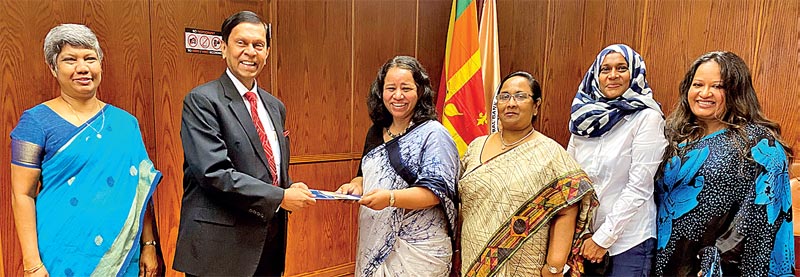Thursday Feb 26, 2026
Thursday Feb 26, 2026
Thursday, 17 February 2022 03:03 - - {{hitsCtrl.values.hits}}

Sri Lanka has achieved gender parity in access to education, but women’s economic participation is well below potential. According to IFC, small and medium-sized enterprises make up a large part of Sri Lanka’s economy, with over one million SMEs accounting for approximately 75% of all businesses. Women’s ownership of formal small and medium-sized enterprises (SMEs) is low in Sri Lanka, at about 25%, and most women struggle to transition away from informal micro-scale businesses.
The Women’s Chamber of Industry and Commerce (WCIC) works to enhance the participation of women entrepreneurs in the Sri Lankan economy, holistically addressing the various issues facing women entrepreneurs.
WCIC Chairperson Anoji De Silva said: “Given the low participation of women entrepreneurs in the Sri Lankan economy and the low interaction with formal financial institutions, despite a willingness on the side of the banks to support women entrepreneurs, the WCIC wanted to explore the reasons for this gap. Exploring the root causes for women entrepreneurs being underserved by formal financial institutions, and especially looking at the role of unconscious bias.”
With this goal in mind WCIC commenced a 10-month project to delve into the barriers limiting women entrepreneurs’ access to finance from formal financial institutions. “The project objectives were to ensure gender sensitive lending practices within the banking sector to foster a conducive environment for women entrepreneurs,” explained Project Manager and Board Member Sarrah Sammoon.
The project had two main components. First a survey was administered among members of the WCIC and regional chambers with 75 respondents to ascertain the member experiences in accessing credit, with specific reference to licensed commercial banks and licensed specialised banks. The membership of the WCIC and nine regional chambers provided a research pool to document real life examples of the challenges faced in accessing credit in different parts of the country.
Secondly, the outcomes of the member survey provided information about the challenges faced by female entrepreneurs when accessing credit. In order to understand what leads to these challenges from within the banks the project conducted a gender audit of bank policies, procedures and practices in two licensed commercial banks and once licensed specialised bank in Colombo.
The policy brief prepared by WCIC provided a brief background about the project activities and most importantly included key recommendations to banks and policymakers. In addition, findings of studies conducted at each of the three banks was presented to each bank along with an individualised set of recommendations.
The policy document was presented to the Ministry of Finance, the Central Bank of Sri Lanka (CBSL), the Institute of Bankers and the Centre for Banking Studies of the Central Bank of Sri Lanka by members of the WCIC Board.
“The brief was presented with the goal of uniting, inspiring and spurring into action the various stakeholders who can create change for women entrepreneurs in Sri Lanka. Through enacting, implementing and enforcing measures to promote, enhance and facilitate women entrepreneurs’ access to finance,” WCIC Chairperson De Silva added.